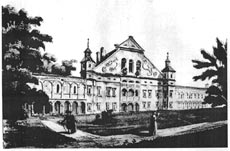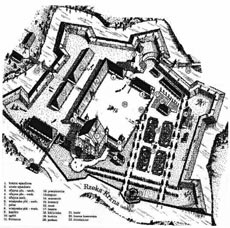- skip to main content
- skip to menu
- information about cookie files
- search on the site
- font and contrast settings
date of publication: 2010-04-09
History of the city

The mentions about the town appeared in the 15th century. Biała was then in the Brzeg voivodeship, which belonged to the Grand Duchy of Lithuania, adjoining to the Podlasie voivodeship, belonging to the Kingdom of Poland.
At the beginning of the 16th century (between 1508 and 1527), Jerzy Illinicz founded, under the Magdeburg law, a private town called Biała on the site of a market settlement. In accordance with the medieval custom, a church was erected by the marketplace. The early history of Biała was marked by disputes and strife among co-owners and neighbours. Shortly, during the influx of reformation in Poland, the town became a local centre of Calvinist and Arian movements and the Roman Catholic parish came to an end. In the 2nd half of the 16th century, the small, poorly developing town was taken over by the Radziwiłł family.

Two hundred and fifty years of rule of the Radzwiłł family resulted in the boom in Biała, which used to be called then "Duke`s" Biała or "Radziwiłł" Biała. In the Radziwiłł period a fortified castle was erected, the Biała Academy was established, which was then made the branch of the Cracow Academy, the city was granted a crest representing Archangel Michael (after the victory over the dragon) as well as many churches and a hospital were built. The city was going through very hard times during the wars with Sweden in 1706 when it was severely destroyed. After the World War I, Biała, which had been famous so far for the manufacture of cloth, carpets and faience vessels began its economic development, numerous production plants were established, including Podlaskie Aircraft Factory. The city became a centre with substantial industrial facilities. The development of the city was ruined by the outbreak of the World War II. After warfare was ended, Biała Podlaskasubstantilly extended its area, new work plant were built, and the textile and furniture industries developed. The city was made the capital of the Biała Podlaska province in 1975 which exerted visible influence on the development of the city itself. Since then, the population of the city has been doubled and Biała Podlaska become a dynamically developing centre of science and culture.
Today, Biała Podlaska is a country town and simultaneously it performs the function of the capital and the administrative centre for the district county of Biała Podlaska.
When using the website, the so-called "Cookies" that allow you to adjust the operation of the website to the individual needs are stored. The conditions for storing or accessing cookies may be specified by the user in the web browser settings. Continuing to use the website without making the above-mentioned changes to the settings of the web browser is considered as the consent of the user to the use of cookies.
✖